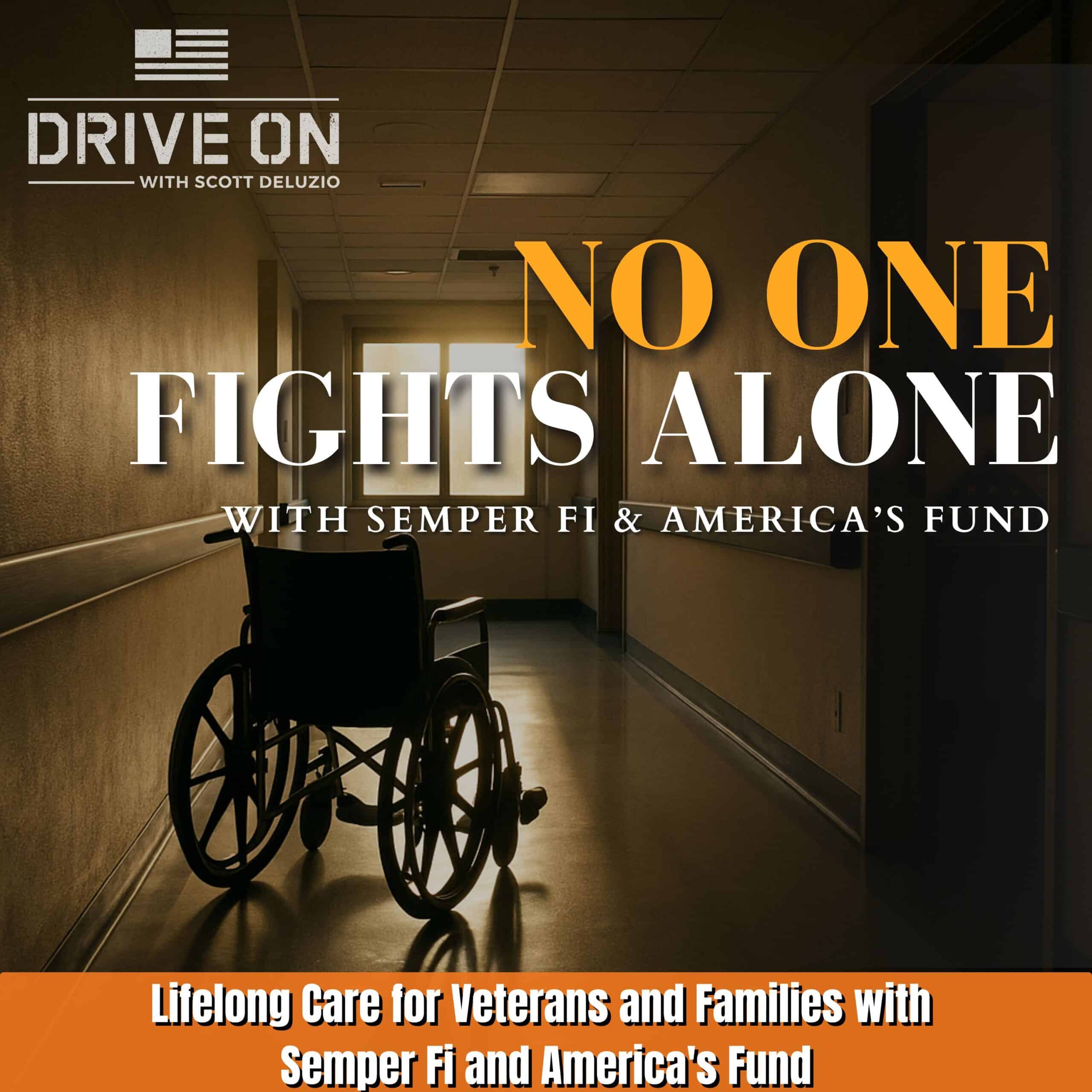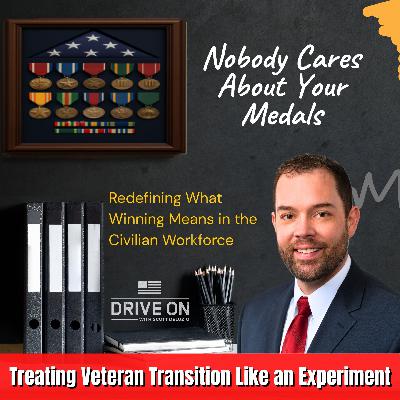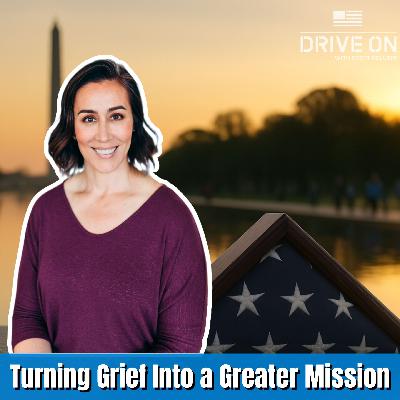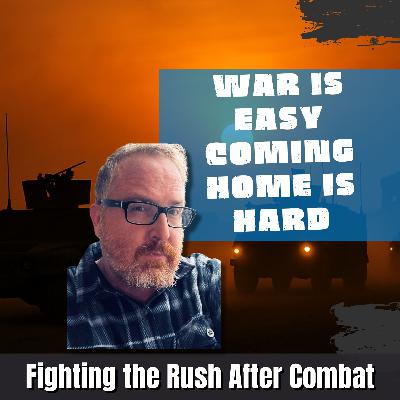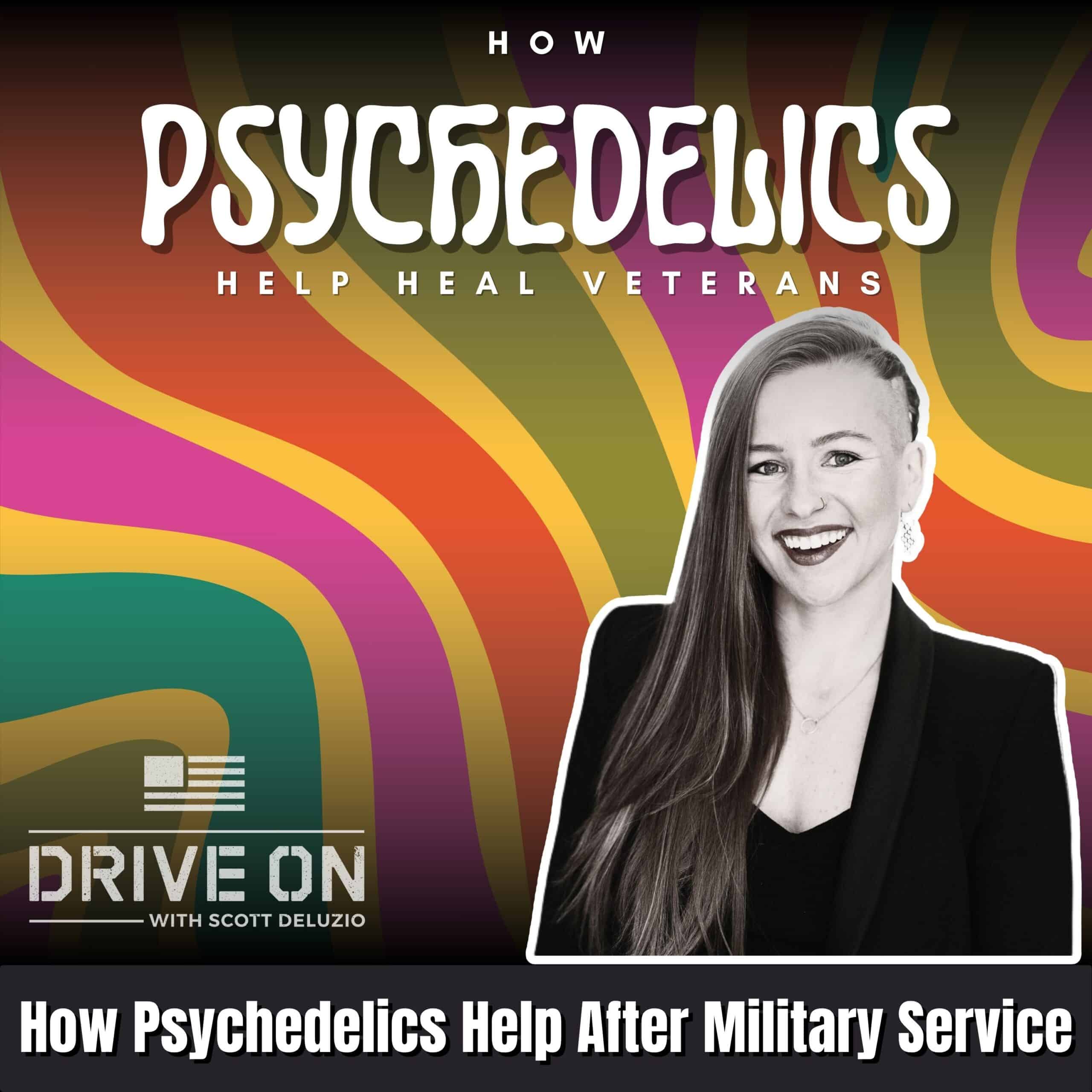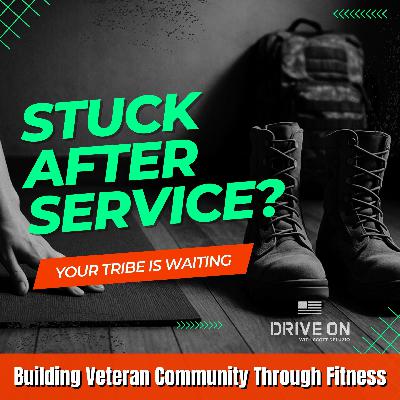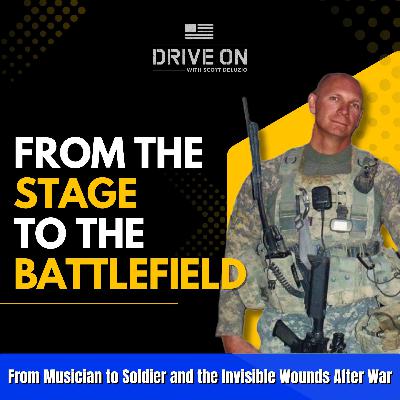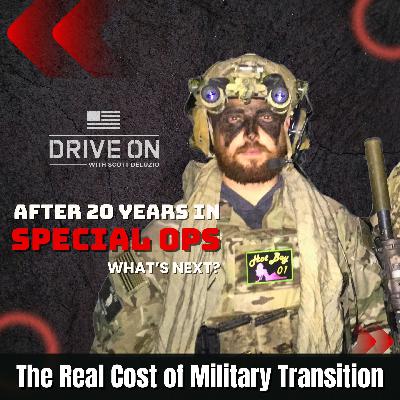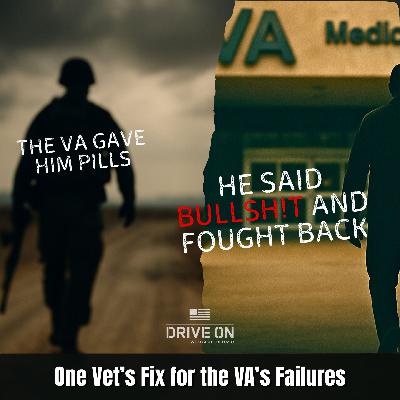Discover Drive On: Helping Veterans Navigate PTSD & Life After Military Service
Drive On: Helping Veterans Navigate PTSD & Life After Military Service

Drive On: Helping Veterans Navigate PTSD & Life After Military Service
Author: Scott DeLuzio
Subscribed: 16Played: 919Subscribe
Share
© 2019-2025 Drive On Podcast
Description
Are you a veteran struggling with PTSD, combat stress, or adjusting to civilian life? Tired of feeling isolated and unsure where to turn for support? You deserve solutions from mental health experts, veteran nonprofits, and fellow veterans who truly understand what you're facing. Each week, host Scott DeLuzio, an Army veteran and Gold Star Brother, shares interviews and practical steps to help you regain purpose, rebuild confidence, and thrive after military service. Find hope and take the next step forward.
539 Episodes
Reverse
The toughest battles don't always happen overseas. Sometimes they hit when you're back home, trying to figure out how to live with injuries, stress, or changes you never saw coming. Karen Hetherington knows this firsthand. She's part of the team at Semper Fi and America's Fund, and she has spent years walking alongside service members and their families during some of their most challenging moments.
In this conversation, Karen shares how The Fund got its start and how it's grown into a lifeline for thousands of veterans. We talk about the little things that make a big difference, like covering bills while a family sits through long hospital stays, and the big things, like connecting someone with life-changing medical treatment or helping them find a new purpose after leaving the military.
You'll hear about fast action that saved a Marine in crisis, the cutting-edge care that helped an amputee get back on his feet, and why listening closely matters more than any program on paper. The Fund restores independence, eases the weight on families, and proves that no veteran has to figure it out alone.
Timestamps:
00:03:15: The dining room table where it all began
00:07:45: Breaking through pride and asking for help
00:12:15: Losing purpose when service ends overnight
00:24:45: Saving a Marine before it was too late
00:29:30: New hope through groundbreaking prosthetics
Links & Resources
Veteran Suicide & Crisis Line: Dial 988, then press 1
Website: https://thefund.org/
For the 14th consecutive year, The Bob & Renee Parsons Foundation and Parsons Xtreme Golf (PXG) will partner with Semper Fi & America's Fund in the Double Down for Veterans Match Campaign. Through the end of the year, The Bob & Renee Parsons Foundation and PXG, will match every donation made to The Fund dollar-for-dollar up to $7.5 million.
Follow The Fund on Facebook: https://www.facebook.com/semperfiandamericasfund
Follow The Fund on Instagram: https://www.instagram.com/semperfiandamericasfund/
Follow The Fund on Twitter/X: https://twitter.com/semperfifund
Follow The Fund on LinkedIn: https://www.linkedin.com/company/semper-fi-fund/
Transcript
View the transcript for this episode.
Sometimes the hardest battles aren't fought overseas. They're fought in living rooms, late at night, when the weight of war refuses to let go. In this powerful conversation, Ashley Sylvester shares the story of her husband, Army Sergeant Jason Sylvester, whose deployments to Kosovo, Iraq, and Afghanistan left invisible scars that followed him home.
Ashley walks us through the subtle shifts she saw over time: sleepless nights, changes in mood, outbursts, and moments when Jason seemed present in body but gone in spirit. She describes the impossible balancing act of protecting their children, seeking help inside and outside the military system, and watching the walls close in.
Her honesty shines a light on the barriers veterans face, the threat of losing security clearances, stigma, and fear of losing careers, which keep too many from getting the support they need. Most of all, she shares the heartbreak of losing Jason to suicide, and why recognizing the warning signs and having hard conversations could make all the difference for another family.
This episode covers a difficult topic, but it's also a call to action: don't ignore what you see, don't wait, and don't give up on finding the help that's out there.
Timestamps:
04:27 - The first signs of sleepless nights and nightmares
13:00 - The rucksack of trauma that only grows heavier
18:00 - Creative strategies Ashley used to get her husband to talk
31:00 - When Jason began to mentally check out
44:15 - The tornado, the loss of everything, and the final spiral
Links & Resources
Veteran Suicide & Crisis Line: Dial 988, then press 1
Follow on Instagram: https://www.instagram.com/JasonSylvester2017
Follow Ashley Sylvester on LinkedIn: https://www.linkedin.com/in/ashley-sylvester-b426a4263
Transcript
View the transcript for this episode.
For many veterans, the hardest battles often come long after the uniform comes off. Erik Lawrence knows what that feels like. After years in Special Forces and contracting, he found himself running on fumes, mentally and physically, until he started digging into why he felt the way he did. From TBIs to toxic exposure, he explored every option available and built a resource to help others find their way.
In this conversation, Erik opens up about the traps veterans often fall into, why transitioning into a new chapter is so important, and the practical steps that can make a real difference. From fasting and detoxing to sorting through endless programs and figuring out what actually fits your needs, this episode will help give veterans the tools to take back their health and move forward.
Timestamps:
03:15 - From the Army straight into an African conflict
04:45 - How chasing the "glory days" wrecks lives
09:30 - Why he built a 500-page guide for veterans
15:30 - Burn pits, heavy metals, and toxic exposure
17:45 - Fasting as a reset for body and mind
Links & Resources
Veteran Suicide & Crisis Line: Dial 988, then press 1
Website: https://Www.vssbooks.com
Fire Support Book: https://a.co/d/4yqy2eI
Transcript
View the transcript for this episode.
Losing your sense of identity after service feels like freefall. For Lee Freeburg, that struggle was real. A Navy hospital corpsman who fought to find his place in uniform and beyond, Lee spiraled into what he calls his weak man phase, living for temporary pleasures, drifting without direction. It took a violent quad accident and a broken collarbone to spark a 180 that changed his life.
Lee opens up about finding purpose through discipline, rebuilding after hitting rock bottom, and using storms as teachers rather than excuses. He shares how faith, fatherhood, and accountability became the anchors for his transformation. From designing a tool to revolutionize an industry to writing a book so his daughter would always know his values, Lee proves that rebuilding starts with self-awareness and grows through action.
This is a powerful journey through loss of identity, rediscovering mission, and the fight to leave a legacy worth carrying forward.
Timestamps:
00:09:00: Facing heartbreak when leaving the uniform behind
00:12:30: The quad accident that became a life reset
00:14:45: Breaking free from the weak man mindset
00:18:00: Lessons from storms and the sailor's analogy for life
00:23:30: Writing a book for his daughter and defining faith
Links & Resources
Veteran Suicide & Crisis Line: Dial 988, then press 1
Book "How to Live a Better Life": https://www.amazon.com/How-Live-Better-Life-Principles/dp/B0DGQ79QKY/
Follow Lee Freeburg on Instagram: https://www.instagram.com/lee.freeburg/
Transcript
View the transcript for this episode.
Leaving the military can feel like stepping off a cliff. One day, you've got steady pay, housing, and a community that's always around. The next day, it's all gone. That's the reality Robert Wheeler faced when he left the Navy. He went from structure and purpose to bills stacking up, silence from the people he served with, and depression that pushed him past 300 pounds.
In this conversation, Robert opens up about why he once threw out his uniforms and refused to even call himself a veteran. He shares the hard lessons he learned about VA benefits, how Chapter 31 gave him time freedom to rebuild, and why fitness is needed for more than just looks. You'll hear him talk about how to handle when negative spirals hit, and how gratitude helped him get out from under that constant rain cloud.
If you've ever felt like you lost everything overnight after taking off the uniform, this episode is a blueprint for finding your footing again.
Timestamps:
03:01 Losing community, pay, and benefits all at once
07:27 Throwing out uniforms and hiding veteran identity
17:49 How fitness pulled him back from depression and 300 pounds
28:40 Pain into progress, building discipline one day at a time
35:36 Emotional regulation and telling yourself to "shut up"
Links & Resources
Veteran Suicide & Crisis Line: Dial 988, then press 1
Website: https://www.battlefittedbrand.com
Follow BattleFitted on Facebook: https://www.facebook.com/battlefitted
Follow BattleFitted on Instagram: https://www.instagram.com/battlefitted
Follow BattleFitted on LinkedIn: https://www.linkedin.com/in/battlefitted
Transcript
View the transcript for this episode.
Losing the uniform can mean losing identity, reputation, and even the sense of mission that kept you moving forward. For many, the transition feels like starting from zero. That is exactly what Stephen Bump faced after 12 years in the Air Force. His journey carried him from aerospace engineering to Eli Lilly, through business school, and finally into building his own consulting firm. Along the way, he learned to trust others, embrace humility, protect family time, and make career moves that aligned with his own values, not just someone else's definition of success.
This conversation is about facing the uncomfortable reality that no one in your civilian job cares about your rank or medals, and how that is not the end but the beginning. From finding purpose in unexpected industries, to reclaiming fitness and family balance, to using the GI Bill and veteran resources to carve a better future, Stephen lays out a roadmap any veteran can use to transition with clarity and confidence.
Timestamps:
00:07:45 - The hardest part of starting over in civilian careers
00:15:45 - Losing fitness and regaining it through entrepreneurship
00:22:15 - The freedom and responsibility of choosing your own clients
00:28:30 - Breaking free from other people's definitions of success
00:39:00 - The veteran resources that made the biggest difference
Links & Resources
Veteran Suicide & Crisis Line: Dial 988, then press 1
Website: https://www.persperity.net
Follow Stephen Bump on LinkedIn: https://www.linkedin.com/in/stephenbump/
Resources mentioned in the episode:
Cameron Brooks Headhunter: https://www.cameron-brooks.com/
Syracuse University Institute for Veterans and Military Families: https://ivmf.syracuse.edu/
GI Bill: https://www.va.gov/education/about-gi-bill-benefits/
Transcript
View the transcript for this episode.
Jennifer Ballou's deployment to Afghanistan was supposed to overlap briefly with her husband's fourth combat tour. They'd have a couple of months in-country together, then he'd head home to the kids while she finished her year. That plan ended the night she learned he'd been killed in action.
She came home with his flag-draped casket and stepped into a new reality: single parent, senior leader, and a grieving spouse trying to make sense of it all. She talks about the tough balance between duty and family, the moments the Army got it right, the times they didn't, and how her kids showed resilience she'll never forget.
Now, as Chief of Staff for the Global War on Terrorism Memorial Foundation, Jennifer is still serving. This time, by making sure the stories of service and sacrifice are never lost. This conversation is about loss, leadership, and finding purpose on the other side of tragedy.
Timestamps
00:04:30 - The night everything changed in Afghanistan
00:09:30 - Flying home with her husband's casket
00:12:50 - Trying to lead soldiers while grieving
00:21:20 - When leadership fell short-and when they stepped up
00:29:40 - From Gold Star fellow to Chief of Staff at the GWOT Memorial Foundation
Links & Resources
Veteran Suicide & Crisis Line: Dial 988, then press 1
Website: https://www.gwotmemorialfoundation.org/
Follow Jennifer Ballou on Instagram: https://www.instagram.com/thejenniferballou/
Follow Jennifer Ballou on LinkedIn: https://www.linkedin.com/in/jenniferballou/
Follow the Global War on Terrorism Foundation:
https://www.facebook.com/gwotmf/
https://www.instagram.com/gwotmf/
https://twitter.com/GWOTMF/
https://www.linkedin.com/company/global-war-on-terror-memorial-foundation
https://www.youtube.com/channel/UCKqTW0t9gKm7c7k_G8xv9Cw
Transcript
View the transcript for this episode.
The battlefield changes you, but the real fight might start when you get home.
Ben Sykes went from web designer to Marine machine gunner during the invasion of Iraq, living through relentless firefights, surreal moments in Saddam's palaces, and the strange calm of enemy fire becoming routine.
But nothing prepared him for the turbulence of reintegration. Restless nights, the crash of losing combat's adrenaline, and the struggle to fit into a world that no longer made sense. In this conversation, Ben opens up about the chemical withdrawal of leaving war, the dangerous paths veterans can fall into, and the hard-earned lessons he wishes he'd known during his transition.
Whether you've been in the fight yourself or love someone who has, his story is a brutally honest look at what it takes to reclaim your footing after service.
Timestamps:
00:10:40 - Trading Hollywood for the yellow footprints
00:12:50 - First firefight on the road to Baghdad
00:23:10 - Securing Saddam's palace and the gold they never saw
00:28:50 - The chemical withdrawal of coming home
00:37:00 - From homelessness to finding a new mission
Links & Resources
Veteran Suicide & Crisis Line: Dial 988, then press 1
Transcript
View the transcript for this episode.
After two deployments and a solid run in the Marine Corps, Susannah Stokes did what a lot of vets do-she took her leadership skills into the corporate world. But even with a great job at Facebook and everything looking good on paper, something still felt off.
This episode talks about what happens when the structure goes away, and you're left trying to figure out who you are. Susannah opens up about feeling undervalued, disconnected, and stuck in roles that didn't reflect what she was capable of. She talks about the identity crash after service, the limits of traditional therapy, and how psychedelics helped her see things differently, without numbing out.
We also get into how she's helping others now and what legal psychedelic support can look like.
Timestamps
00:02:00 - From a Marine Corps deployment to Facebook's corporate culture
00:06:45 - Why many vets are under-placed in civilian roles
00:14:20 - Losing faith, identity, and the question that changed everything
00:23:40 - How psychedelics rewired trauma loops and revealed purpose
00:44:20 - Finding legal, structured healing through guided plant medicine
Links & Resources
Veteran Suicide & Crisis Line: Dial 988, then press 1
Website: https://www.metamorphosis.ventures/
Transcript
View the transcript for this episode.
You served your country, endured physical pain, and now struggle to get the benefits you rightfully earned. If navigating the VA disability claims system feels like a second battle, this episode is your lifeline.
Dr. Adam Weissman, an emergency physician turned veteran advocate, pulls back the curtain on the VA disability rating process. He shares insider knowledge to help you sidestep common pitfalls, clarify confusing terms, and leverage expert medical evaluations from REE Medical to achieve the disability rating you truly deserve. Stop settling for less. Here's your path to securing better support, financial stability, and peace of mind.
Timestamps
00:02:00 - The Hidden Roadblocks in VA Disability Claims
00:10:30 - How Expert Evaluations Can Boost Your Rating
00:21:00 - What Happens When You're Underrated
00:28:15 - The Extra Benefits of Higher Ratings
00:34:00 - Avoiding Predatory Disability Claim Services
Links & Resources
Veteran Suicide & Crisis Line: Dial 988, then press 1
Website: https://driveonpodcast.com/recommends/ree-medical/*
Follow REE Medical on Facebook: https://www.facebook.com/reemedicalvets
Follow REE Medical on Instagram: https://www.instagram.com/reemedicalvets/
Follow REE Medical on Twitter/X: https://x.com/REEMedical
Follow REE Medical on LinkedIn: https://www.linkedin.com/company/ree-medical
Other links: https://www.youtube.com/@REEMedicalVets
Transcript
View the transcript for this episode.
* - This page contains affiliate links. If you click a link and purchase a product or service, I may earn a small commission, which in no way affects the price you pay for the service.
Chris Smith didn't plan to become the program director of a veteran fitness nonprofit. When he left the Army, his only goal was to stay afloat. But after facing down PTSD, relationship struggles, and a stretch of homelessness, he found himself on a new path-one focused on health, consistency, and community.
In this episode, Chris talks about how Warrior Strong helped him rebuild his identity and give back to others dealing with similar struggles. He shares what it was like to go from engineering missions in Iraq to sleeping in his car, and how a single yoga class turned into a whole new way to serve.
Whether you're a veteran looking for your next step or just trying to feel a little more grounded, this conversation is about what's possible when you stop waiting and start showing up.
Timestamps
00:01:00 - 9/11 hit during basic training
00:12:30 - Losing stability after service
00:17:00 - How yoga and fitness changed everything
00:34:15 - What Warrior Strong offers right now
00:44:00 - Advice for veterans stuck in place
Links & Resources
Veteran Suicide & Crisis Line: Dial 988, then press 1
Website: https://www.warriorstronginc.org/
Follow Warrior Strong on Facebook: https://www.facebook.com/warriorstronginc
Follow Warrior Strong on Instagram: https://www.instagram.com/warriorstronginc/
Follow Warrior Strong on YouTube: https://www.youtube.com/@warriorstronginc.9685
Follow Warrior Strong on LinkedIn: https://www.linkedin.com/company/warrior-strong
Transcript
View the transcript for this episode.
When the uniform comes off, many veterans feel like they've lost their team. And with it, their purpose. Michael "Sully" Sullivan knows that feeling firsthand, having spent 30 years in Special Forces. But instead of fading into isolation, he stepped into a new mission with Team RWB, helping veterans reconnect, rebuild accountability, and strengthen their health.
In this conversation, Sully shares how Team RWB brings veterans together around fitness, connection, and community. From cross-country flag relays to local meetups.
Topics Discussed
How Sully's Special Forces career led him to Team RWB's mission
The story and impact of the Old Glory Relay
How accountability and community crush isolation after service
The connection between physical activity, health, and mental wellness
How Team RWB helps veterans stay engaged through local chapters and the app
Notable Quotes
"It took a team to get the team across the country."
"Your participation is helping out that person that you're seeing at these different events."
"You join the team, you see yourself as like, not only taking care of yourself, but your participation is helping out that person."
"There's just so much power, I think, in the veteran population."
"The idea is that we're always there for you to come back."
Links & Resources
Veteran Suicide & Crisis Line: Dial 988, then press 1
Website: https://teamrwb.org
Follow Michael Sullivan on Facebook: https://www.facebook.com/mpsulli335
Follow Michael Sullivan on Instagram: https://www.instagram.com/sully_rwb
Follow Team RWB on Twitter/X: https://twitter.com/teamrwb
Follow Team RWB on Instagram:
https://www.instagram.com/teamrwb/
Transcript
View the transcript for this episode.
Joseph Fontenot gave up a rising career in music to enlist in the Army, only to be thrust into unexpected combat roles in Iraq and Afghanistan.
He discusses his experiences while deployed, injuries that aren't always physical, and the challenge of finding direction and building a meaningful life after returning home.
Links & Resources
Veteran Suicide & Crisis Line: Dial 988, then press 1
Follow Joseph Fontenot on Facebook: https://www.facebook.com/groups/2335103330160442
Follow Joseph Fontenot on Instagram: https://www.instagram.com/josephfontenot74/
Follow Joseph Fontenot on LinkedIn: https://www.linkedin.com/in/joseph-j-fontenot-322a8088/
Transcript
View the transcript for this episode.
Transitioning out of the military brings challenges that don't end when the uniform comes off. Benefits, family readiness, and the search for a new purpose can all feel overwhelming. In this conversation, USAF Lt. Gen. (Ret) Brian Kelly, President and CEO of the Military Officers Association of America, shares how his decades of service have led him to focus on protecting what veterans and their families have earned.
A key part of that mission is the TotalForce+ conference, a groundbreaking event designed to connect service members, veterans, government leaders, and industry partners. Brian breaks down the four pillars driving the conference: career transition, community support, benefits advocacy, and crisis response, and why bringing all these voices together matters for the future of the military community.
From scholarships for military kids to disaster relief when veterans are displaced, to real solutions being built at TotalForce+, this episode gives you a look at how advocacy and action come together. If you've been searching for hope that someone is fighting for you and your family, this conversation will show you exactly where that work is happening.
Timestamps
00:02:30 - Why Brian Kelly chose to continue serving after 33 years in uniform
00:06:45 - How MOAA scholarships help military kids overcome constant moves
00:08:45 - Crisis relief for veterans who fall through the cracks
00:17:15 - The four pillars shaping the Total Force Plus conference
00:23:00 - Using new tools to make transition smoother for veterans
Links & Resources
Veteran Suicide & Crisis Line: Dial 988, then press 1
Website: https://totalforceplus.moaa.org/
Follow MOAA on Facebook: https://www.facebook.com/moaa
Follow MOAA on Instagram: https://www.instagram.com/moaaofficial/
Follow MOAA on Twitter/X: https://twitter.com/MilitaryOfficer
Follow MOAA on LinkedIn: https://www.linkedin.com/company/moaa
Other links: https://moaa.org/
Transcript
View the transcript for this episode.
Cole Grace knows danger up close. In Iraq, he spent his days disarming IEDs and dodging sniper fire. But coming home wasn't the relief he'd expected. Instead, he found himself at war again, trapped in a loop of relentless perfectionism, unexplained chronic pain, and an addiction that crept up quietly, almost unnoticed.
In this conversation, Cole opens up about the brutal reality of fighting battles you can't see. He shares how he finally confronted childhood wounds that had intensified his combat trauma and what it took to silence the inner voice that always said he wasn't enough. If you've ever felt stuck in your head, lost in your own pain, or wondered if peace is even possible, this episode is for you.
Timestamps:
01:00 - Facing bombs and bullets in Iraq
08:45 - How combat fuels relentless perfectionism
20:30 - Addiction, chronic pain, and medical dead-ends
28:15 - Rewiring trauma without the BS
35:45 - Finding peace after chasing success
Links & Resources
Veteran Suicide & Crisis Line: Dial 988, then press 1
Follow Cole Grace on YouTube: https://youtube.com/@cgrace21
Transcript
View the transcript for this episode.
If you're active duty or a veteran with kids, you already know the school system doesn't move with you. New duty station, new rules, new problems, and your kids pay the price.
Natalie Mack has been homeschooling for over two decades while her family bounced from base to base, including overseas. She's not selling you sunshine and Pinterest-perfect school days. She breaks down exactly what it takes to homeschool in a military lifestyle, what families screw up, and how to do it smarter.
This episode discusses:
What you need to know before your next PCS
How to deal with overseas laws that technically ban homeschooling
Why more military families are ditching public school and how it affects military retention
The benefits for your kids (and yourself) when you take back control
Links & Resources
Veteran Suicide & Crisis Line: Dial 988, then press 1
Website: https://militaryhomeschoolers.org/
Follow Natalie Mack on Facebook: https://www.facebook.com/natalie.minormack/
Follow MHA on Facebook: https://www.facebook.com/militaryhomeschoolersassociationMHA
Instagram: https://www.instagram.com/military_homeschoolers/
Follow Natalie Mack on Instagram: https://www.instagram.com/homeschoolnataliemack
Follow Natalie Mack on LinkedIn: https://www.linkedin.com/in/natalie-mack-homeschool/
Transcript
View the transcript for this episode.
Veterans often return home to a world that feels muted. Mark Haddad, a former Army soldier and contractor, breaks down the reason why: our body-mind-soul system gets rewired by trauma and adrenaline, and everyday life just can't compete. This episode talks about the science behind why vets crave danger, sabotage stability, and feel disconnected from "normal."
From surviving a parachute malfunction to confronting evil in Africa, Mark shares stories that any vet who's struggled to slow down will understand. You'll learn how to stop blaming yourself for what your brain and body were trained to do.
Timestamps
00:02:15 - Surviving a combat parachute malfunction
00:06:45 - Realizing your purpose isn't downrange
00:10:15 - Why veterans chase chaos after war
00:16:30 - The adrenaline bar theory explained
00:44:30 - How to regain control over your internal chemistry
Links & Resources
Veteran Suicide & Crisis Line: Dial 988, then press 1
Website: https://www.markhaddadauthor.com
Follow Mark Haddad on Instagram: www.instagram.com/markhaddadauthor1
Transcript
View the transcript for this episode.
He gave the Army 20 years, 8 months, and 8 days, nearly all of it in special operations. From Ranger Regiment to Green Beret team sergeant, Joshua Daniel lived and breathed the mission. But when the wars ended, so did the mission, and he felt it in every bone, every memory, every unfinished story.
Rather than fade out, he built something bigger than himself.
In this episode, Joshua opens up about the pain of stepping away, the harsh words that forced him to rethink his exit, and how he turned guilt into leadership with Hero Games Charity and Counterculture Solutions. From one-on-one mentoring to purpose-driven events honoring Gold Star families, he's proving there's still work worth doing, and it starts with refusing to settle for half a life.
Timestamps:
00:00:30 - From 134 pounds to Green Beret: Building grit through the suck
00:06:00 - The moment a younger soldier called him out-and why it changed his path
00:10:00 - Starting over with Hero Games and finding new purpose
00:19:45 - Why honoring one family a year matters more than doing it all
00:38:00 - The hard truth about veterans wasting their lives post-military
Links & Resources
Veteran Suicide & Crisis Line: Dial 988, then press 1
Website: https://www.counterculturesolutions.com/
https://herogamescharity.com/
Follow Joshua Daniel on Facebook: https://www.facebook.com/JDxHGCxCCS
Follow Joshua Daniel on Instagram: https://www.instagram.com/jdxhgcxccs/
Transcript
View the transcript for this episode.
Kris Searles got blown out, broken down, and pushed out. The VA gave him pills. He gave them the finger.
Instead of numbing out, he wrote a check, got stem cell therapy, fixed his back, got his life back, and started helping others do the same. Now, through Overwatch 6, he's funding treatments that work, no pills, no surgeries, no BS.
He's also training vets to coach each other through trauma. No therapy jargon. Just guys who've been through hell, helping others crawl out of it.
If you've ever stared at your pill bottle and thought, "There's gotta be a better way," this may be that way.
Timestamps:
00:02:30 - Iraq sniper op, hunting high-value targets
00:11:45 - Ambushed and losing his whole team days before redeployment
00:16:15 - Crawling out of bed until stem cells changed everything
00:20:00 - VA's failures and how real healing works
00:37:45 - Coaching vets through trauma without the psychobabble
Links & Resources
Veteran Suicide & Crisis Line: Dial 988, then press 1
Website: https://www.overwatch6.com/
https://www.mentoragility.com/find-a-vttv-meeting
Follow Overwatch 6 on Instagram: https://www.instagram.com/overwatch_6/
Transcript
View the transcript for this episode.
If life after the military feels like it's constantly on edge, you need tools that actually help you get your head straight.
Dr. Barbara Thompson is an Army veteran and psychologist who worked directly with Special Operations and high-risk teams who didn't have the luxury of falling apart. She knows what high stress does to the brain and how to fix it before it burns you down.
This episode is for the guy who's tried to muscle through PTSD, anxiety, or feeling disconnected (and it's not working). You'll learn how to spot when your brain is running on survival mode and what to do in the moment to break the spiral.
Links & Resources
Veteran Suicide & Crisis Line: Dial 988, then press 1
Website: https://drbarbthompson.com
Follow Barbara Thompson on Facebook: https://www.facebook.com/profile.php?id=100025177493267
Follow Barbara Thompson on Instagram: https://instagram.com/barb.r.thompson
Follow Barbara Thompson on LinkedIn: https://www.linkedin.com/in/barbara-thompson-7487aa8b
Transcript
View the transcript for this episode.


